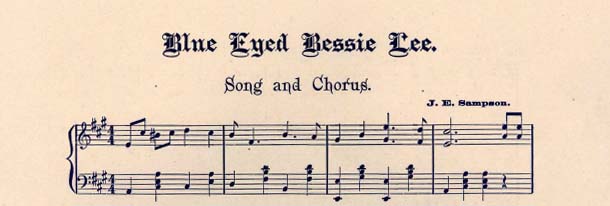
Historic Sheet Music Collection
Document Type
Score
Publication Date
1917
Lyrics
[Verse 1]
The Major wrote the chorus but he fell down on the verse
The Col’nel tried to write it but he only made it worse
They called in Captain Cuttle but he missed it by a mile
So they left it to the Sergeant of the file
Said he, “we need no verse at all to this here little thing,”
So they went and taught the Sammies how to sing.
[Chorus]
We’re going over, we’re going over,
They want to settle up that fuss, and they put it up to us,
So what do we care, so what do we care,
We’ll go sailing cross the foam;
And we’ll show them what the Yankee doodle boys can do, then we’ll all come marching home.
[Verse 2]
The boys all sang the chorus to the leader of the band
He taught his men to play it and it sounded mighty grand
Said he, “I’ll write a part in for the fellow with the drum
So the boys in France can hear us when we come”
The orders came next morning and they yelled we’re on our way
And they sang as they went sailing down the bay.
[Chorus x2]
Recommended Citation
Sterling, Andrew B.; Grossman, Bernie; and Lange, Arthur, "We're Going Over" (1917). Historic Sheet Music Collection. 1886.
https://digitalcommons.conncoll.edu/sheetmusic/1886
The views expressed in this paper are solely those of the author.
Comments
Title: We’re Going Over
Lyrics and music by: Andrew B. Sterling, Bernie Grossman, Arthur Lange
Publisher: Joe Morris Music Co., 145 W. 45th St. New York
Copyright: 1917 by The Joe Morris Music Co. 145 W. 45th St. New York, N.Y. International copyright secured – Albert & Son Australian Agents Sidney.
Advertisements: back cover: sheet music for Joe Morris Music Co.’s Song Supreme – “America, Here’s My Boy” words by Andrew B. Sterling, music by Arthur Lange. Copright 1917 by The Joe Morris Music Co. 145 W. 45th St. New York, N.Y. International copyright secured – Albert & Son Australian Agents Sidney.
Some of these resources may contain offensive language or negative stereotypes. Such materials should be seen in the context of the time period and as a reflection of the attitudes of the time. The items are part of the historical record, and do not represent the views of the libraries or the institution.